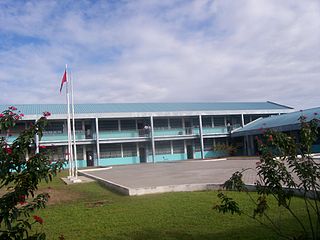
The General Certificate of Secondary Education (GCSE) is an academic qualification in a range of particular subjects, taken in England, Wales, and Northern Ireland. State schools in Scotland use the Scottish Qualifications Certificate instead. Private schools in Scotland may choose to use GCSEs from England.
The Leaving Certificate Examination, commonly referred to as the Leaving Cert or (informally) the Leaving, is the final exam of the Irish secondary school system and the university matriculation examination in Ireland. It takes a minimum of two years' preparation, but an optional Transition Year means that for those students it takes place three years after the Junior Certificate Examination. These years are referred to collectively as "The Senior Cycle." Most students taking the examination are aged 16–19; in excess of eighty percent of this group undertake the exam. The Examination is overseen by the State Examinations Commission. The Leaving Certificate Examinations are taken annually by approximately 55,000 students.

Matura or its translated terms is a Latin name for the secondary school exit exam or "maturity diploma" in various European countries centered around the former Austro-Hungarian Empire, including Albania, Austria, Bosnia and Herzegovina, Bulgaria, Croatia, Czechia, Hungary, Italy, Kosovo, Liechtenstein, Montenegro, North Macedonia, Poland, Serbia, Slovakia, Slovenia, Switzerland and Ukraine.
Tenth grade is the tenth year of formal or compulsory education. It is typically the second year of high school. In many parts of the world, students in tenth grade are usually 15 or 16 years of age.
The Singapore-Cambridge General Certificate of Education Ordinary Level is a GCE Ordinary Level examination held annually in Singapore and is jointly conducted by the Ministry of Education (MOE), Singapore Examinations and Assessment Board (SEAB) and the University of Cambridge Local Examinations Syndicate (UCLES).

Hanoi-Amsterdam High School is one of the four regional magnet schools in Hanoi, Vietnam. It is regarded as one of the most prestigious and highly ranked academically selective high schools in Vietnam, from Hanoi.
Tawjihi or Al-Tawjeehi is the General Secondary Education Certificate Examination in Jordan and Palestine. It is the last stage of school education. To sit for the exam, students are required to finish 2 years of pre-school education, 10 years of basic education, and 2 years of secondary academic or vocational education. Subjects in the exam include Arabic, English, Mathematics, Physics, Biology, Chemistry, Computer Science, Geology, Civil Studies and Islamic studies.

The A-level is a subject-based qualification conferred as part of the General Certificate of Education, as well as a school leaving qualification offered by the educational bodies in the United Kingdom and the educational authorities of British Crown dependencies to students completing secondary or pre-university education. They were introduced in England and Wales in 1951 to replace the Higher School Certificate. The A-level permits students to have potential access to university if their grade is of satisfactory quality.

The O-Level is a subject-based qualification conferred as part of the General Certificate of Education. It began in the United Kingdom and has been adopted, often with modifications, in several other countries.

Mazowe Boys High School in Harare, Zimbabwe is a Salvation Army boarding school established in 1959. The school teaches Christian values in accordance with Salvation Army principles.

Debe High School is a co-educational high school first established in 2000 which offers forms 1-6. It is situated in south Trinidad in Debe. The school's motto is Şeize the Day.
Dominican Convent High School is a private Catholic day school for girls in Harare, Zimbabwe. One of the oldest established schools in Zimbabwe, Dominican Convent was founded in 1892 by Mother Patrick Cosgrave, an Irish nun, with 10 pupils.
The Sri Lankan Advanced Level (A-level), is a General Certificate of Education (GCE) qualification exam in Sri Lanka, similar to the British Advanced Level, conducted annually by the Department of Examinations of the Ministry of Education. It is usually taken by students during the final two years of collegiate level (grade 12 and 13 or external candidates, after they have completed GCE Ordinary Level exams. The majority of candidates enter the exams via their respective schools, while candidates who have finished school education can also apply as private applicants. The qualification also serves as an entrance requirement for Sri Lankan state universities. The exams are held in three mediums: Sinhala, Tamil and English.
The education system in Lahore is formulated along specific modern, religious, cultural, social, psychological, commerce and scientific injunctions. Lahore is Pakistan’s largest producer of professionals in the fields of science, technology, IT, engineering, medicine, nuclear sciences, pharmacology, telecommunication, biotechnology and microelectronics. Most of the reputable universities are public, but in recent years there has also been an upsurge in the number of private universities. The current literacy rate of Lahore is 64%. The standard national system of education is mainly inspired from the British system. The system also aims to imbibe a secular outlook among the students with the awareness of the rich cultural heritage of Pakistan. Lahore has a wide range of schools, colleges and universities that caters to diverse streams.
Sakubva High School is a day school located within Sakubva high density township in Mutare, Zimbabwe. Formerly Sakubva Secondary School but now called Sakubva High School, it is also referred to as Sakubva 1 High School. It is the oldest secondary school in Sakubva township. It produced a number of prominent students from the township. Students typically walk to school, in some instances students walk long distances to school.

The British School in Colombo (BSC) is an international school in Borella, a suburb of Colombo, Sri Lanka.
Zengeza High School is an urban, day coeducational secondary school in Chitungwiza, Harare Province, Zimbabwe. It has a student population of 2000 pupils and 90 teachers who enroll in two sessions. It has 10 classes for each grade from form 1 to form 4, and 3 classes at advanced level categorized as Sciences, Commercials and Arts.

St. Joseph's Convent, Port of Spain is a government-assisted all-girls Roman Catholic secondary school in Port of Spain, Trinidad and Tobago. It was founded in 1836 by Sisters of St. Joseph of Cluny, and is the oldest continuous secondary school in Trinidad and Tobago. It celebrated its 180th anniversary in 2016. The school is one of the best performing schools in the Caribbean in both the Caribbean Secondary Education Certificate (CSEC) examinations and Caribbean Advanced Proficiency Examinations (CAPE) examinations. The school is governed by a Board of Management appointed and chaired by the Archbishop of Port of Spain.









